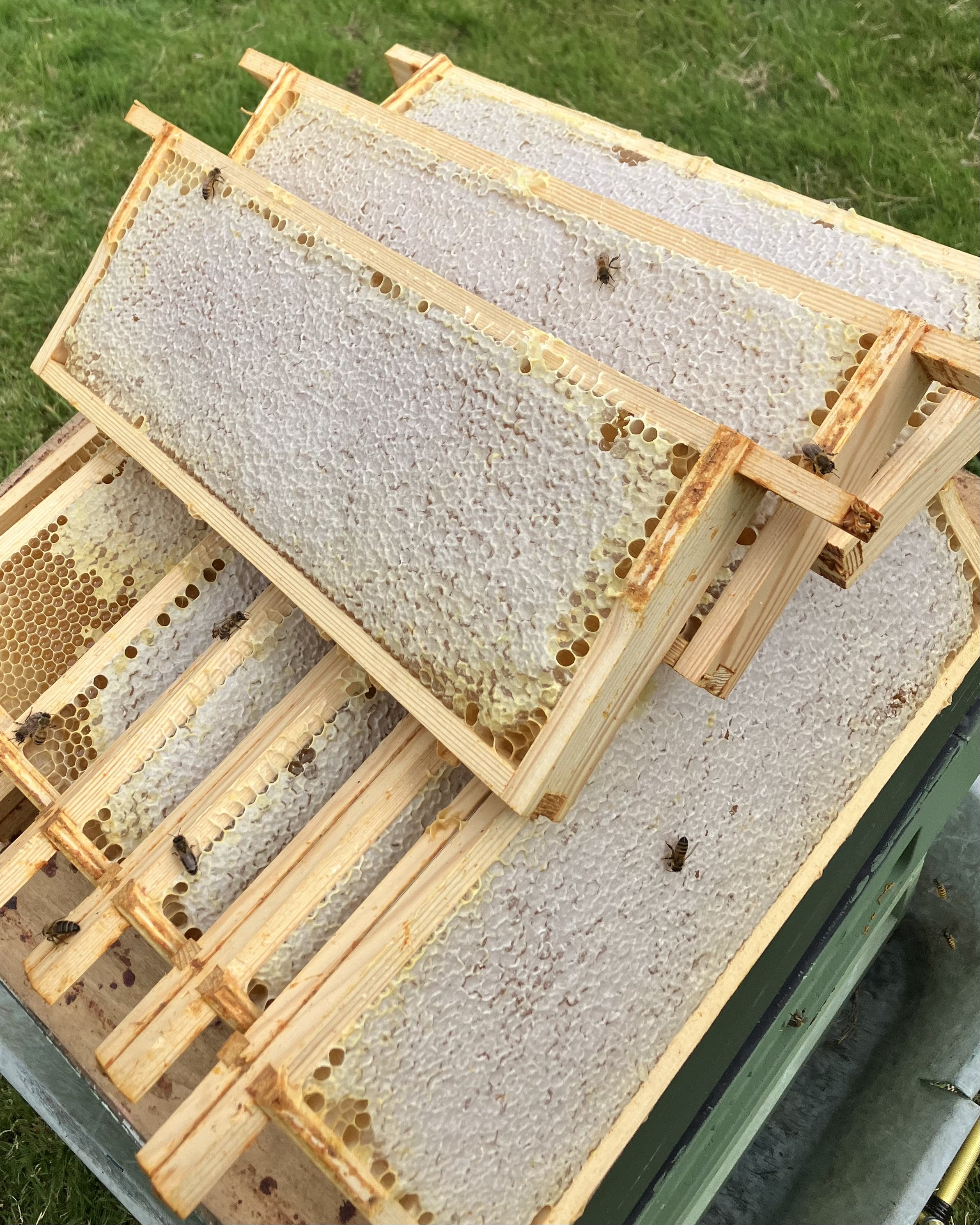
Sam’s Honey Bees
FAQs
-
Sam has been keeping bees since 7th May 2022 in Forton, Chard. However, his interest in beekeeping began years before, and his journey truly started after a chance encounter with a local beekeeper.
-
Our honey is made naturally, straight from the hive to the jar. The bees collect nectar from the local Somerset countryside, reduce its moisture content, and cap it with wax when it's ready. We harvest the honey, sieve it to remove wax cappings, and jar it without any processing or additives – just pure, untreated honey as the bees made it.
-
To preserve the quality of your honey, it’s best to store it in a cool, dry place. Honey likes to stay warm, and bees keep it at around 33°C in the hive. If your honey crystallises (a natural process), simply place the jar in a bowl of warm water until it returns to a liquid state.
-
Crystallisation is a sign that your honey is pure and untreated. It’s completely normal, especially with natural honey. If your honey crystallises, place the jar in a bowl of warm water and gently heat it until the crystals dissolve. Avoid using a microwave, as it can damage the natural enzymes in the honey.
-
Many people find that local honey can help with hay fever and allergies. The theory is that consuming honey from local plants may help your body build resistance to local pollen. While it may not work for everyone, several customers have reported significant relief from their symptoms by consuming our local honey.
-
Honey has numerous health benefits:
Antioxidants: Honey contains antioxidants that can help protect cells from damage.
Antibacterial properties: Honey can support your immune system and even be used to treat burns and wounds.
Energy boost: Honey is a natural carbohydrate, giving your body a quick energy source.
Cold and flu relief: Honey can soothe sore throats and help boost your immune system.
Tissue repair: Some honey can help repair tissue damaged by infection, thanks to its antibacterial properties.
-
At the moment, we primarily sell honey. We also produce natural beeswax lip balm, but we are currently reviewing the regulations before making it available for sale. Keep an eye on our site for updates!
-
Yes! At Sam’s Honey Bees, we are committed to sustainable beekeeping. Our beekeeping methods focus on the natural health and wellbeing of the bees. We take only the surplus honey and use natural treatments to protect the colony from pests. All excess wax is repurposed to make candles and lip balm, ensuring nothing goes to waste.
-
We conduct regular hive inspections to check for pests and diseases, such as the varroa mite and foulbrood. Cleanliness is key, so we clean all tools and equipment between hive visits. We also treat the bees after the honey harvest to protect them from parasites during the winter, giving them the best chance of staying healthy and productive.
-
Yes! We offer nucleus colonies (small starter colonies) for sale, as well as custom-built beehives. These nucleus colonies come with a mated queen, worker bees, and frames of brood and honey. It’s the perfect way to start your beekeeping journey. Contact us to learn more about availability and how we can help you get started.
-
Local honey supports local beekeepers and helps protect the environment. Unlike many supermarket brands, which often blend honey with cheaper syrups or process it heavily, Sam’s Honey Bees honey is pure and untreated, keeping all of its natural health benefits and flavours intact. Buying local honey ensures you get the real thing while supporting sustainable agriculture and local ecosystems.
-
The Asian hornet is a serious threat to bee colonies, and it's important to report any sightings. If you think you've spotted an Asian hornet, report it immediately to the BBKA (British Beekeepers Association) through their website. These pests can destroy bee colonies quickly, and early detection is key to preventing their spread.
Still Have Questions?
If you didn’t find the answer to your question here, feel free to contact us. We’re always happy to help!